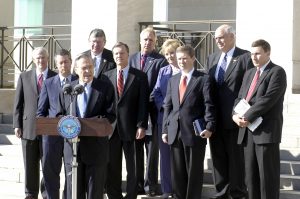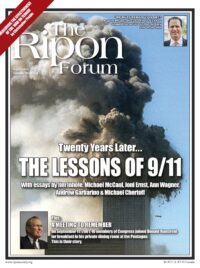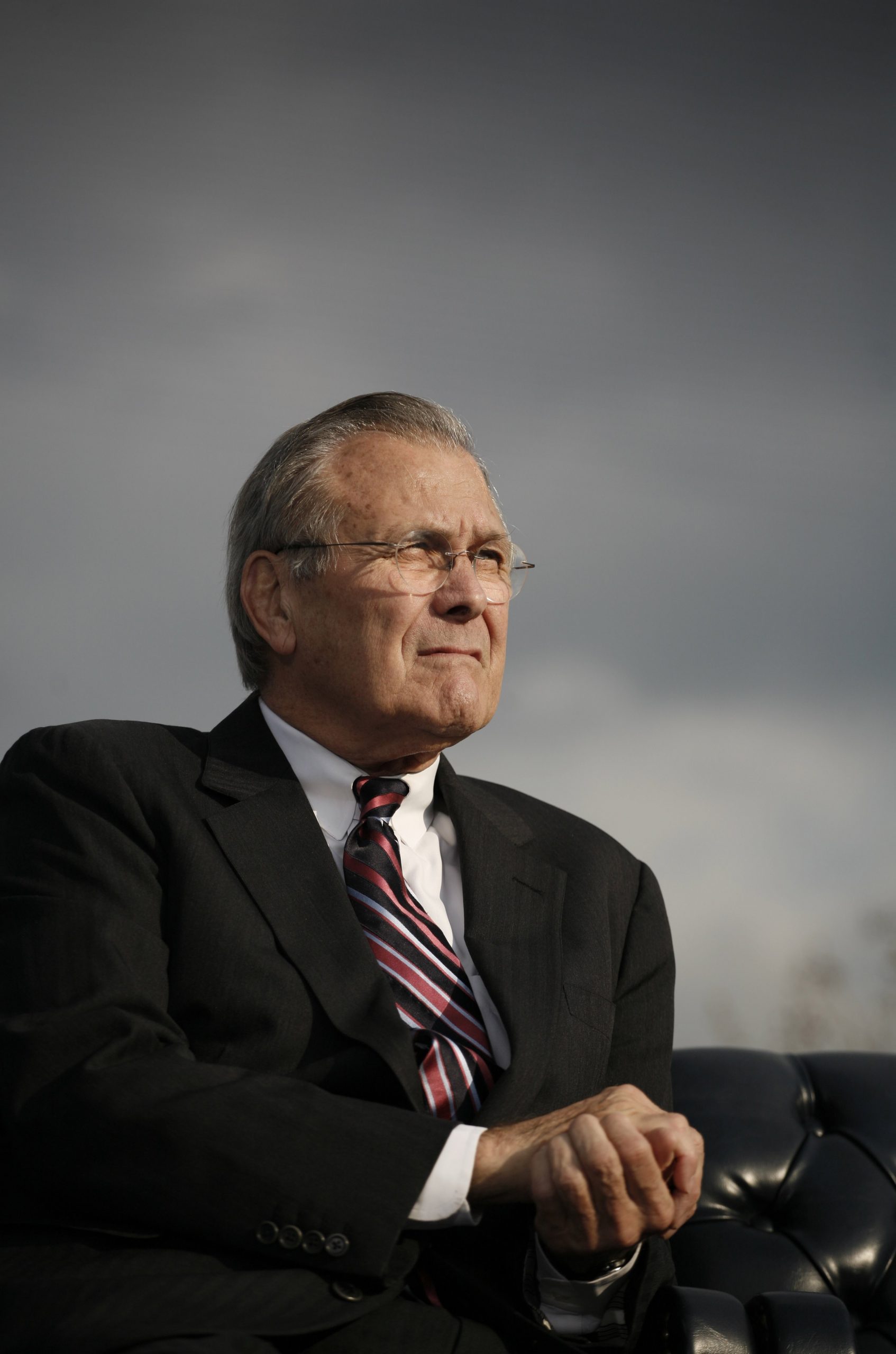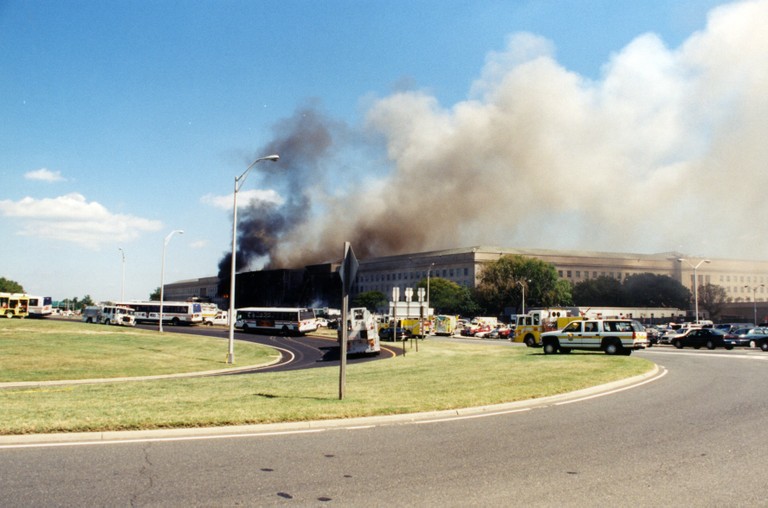On September 11, 2001, 10 members of Congress joined Donald Rumsfeld for breakfast in his private dining room at the Pentagon. This is their story.
Meetings are a dime a dozen in Washington. Most are forgettable. Many are avoidable. And some seem to have no purpose at all. But occasionally, a meeting comes along that is forever remembered by those who attend it.
Twenty years ago, Secretary of Defense Donald Rumsfeld hosted such a meeting in his private dining room at the Pentagon. In a read ahead memo written by Powell Moore, Rumsfeld’s head of legislative affairs, the meeting was described as an opportunity for the Defense Secretary “to seek the continued support and active promotion of Department priorities by House Republicans who have supported your efforts.”
Ten Republican lawmakers would join him for breakfast. The group would discuss not only the annual National Defense Authorization Act which was scheduled to be debated on the House floor that week, but Rumsfeld’s broader goal of strengthening and transforming the military so it was more agile and better able to meet 21st century threats. And yet looking back on it two decades later, what ultimately made this meeting so memorable for those who attended it was not the issues at hand but the day they were discussed.
The meeting was held on September 11, 2001.
In the room
“It was a beautiful day,” John Hostettler recalled, when asked recently to paint a picture of that morning and his thoughts heading into the 8:00 am meeting. Hostettler was representing Indiana’s 8th Congressional District at the time. Elected as part of the “Republican Revolution” class of 1994, he was a member of the Armed Services Committee and, as the read ahead memo to Rumsfeld noted, served as Vice Chairman of the Terrorism Subcommittee. “I was pretty hopeful with regard to this breakfast,” he said.
John Shimkus struck a similar note looking back on the day.
“It was a crisp, clear September morning,” he observed. Shimkus was then serving his third term as the Representative from the 20th District of Illinois. A member of the Energy & Commerce Committee, he was also a West Point graduate who spent six years in the Army and was serving as a Lieutenant Colonel in the Army Reserve at the time. “I have a military background, so I think I was invited because of that and because I supported the military.”
He had met Rumsfeld before, and, he noted, was from Rumsfeld’s home state. “I had been with the Secretary a couple of times, and he’s all business,” he said. “He’s also an Illinoisan, so we bantered about Illinois a little.”
For Mark Kirk, going to see Rumsfeld — or “Rummy,” as he called him — was like “old home week.” Kirk was also from Illinois, and had been elected the previous November to represent the same area of the state that Rumsfeld represented when he served in the House in the 1960s. A member of the Armed Services Committee who would later be elected to the U.S. Senate, he was also, like Shimkus, a military veteran, having served as an intelligence officer in the Navy and Navy Reserve. Like Shimkus, he also remembered Rumsfeld’s business-like approach to the meeting that morning.
“Rummy was always completely in command,” Kirk said. “To be there having breakfast in the Secretary’s private dining room was quite an honor.”
“Rummy was always completely in command. To be there having breakfast in the Secretary’s private dining room was quite an honor.”
For Mac Thornberry, it was also the second time he would be meeting with Rumsfeld at the Pentagon that year. A member of the Armed Services Committee and leader in the same kind of military reform effort that both the Defense Secretary and the President were pushing, Thornberry — who had represented the 13th District of Texas since 1995 — had joined Rumsfeld in May for a news conference in the Pentagon briefing room to discuss the increasing importance of space in military and intelligence affairs. He viewed the September 11th meeting as a continuance of that discussion.
“I remember the topic was about what people at the time were calling military transformation,” the Texas Republican recalled. “It was reform of the military. President Bush — or then-candidate Bush — had given a speech at the Citadel about military reform. I think this was Secretary Rumsfeld bringing together some potential congressional allies to push forward on that effort, which was something I was very interested in.”
Chris Cox — who had represented the Orange County region of California in the House since 1989 and was also serving as Chairman of the House Republican Policy Committee at the time — had a similar recollection.
“The purpose was to discuss the need to rethink our defense strategy as we prepared for that year’s DOD authorization bill and the annual defense appropriations bill,” he stated. “Both President Bush and Secretary Rumsfeld were intent on redesigning the Pentagon to adjust to the post-Cold War threats. After the fall of the Soviet empire and America’s victory in the Cold War, they believed America faced different and new challenges.”
According to Cox, Rumsfeld touched on these challenges during their discussion in remarks that would soon prove to be remarkably prescient.
“The message was essentially, ‘We live in a dangerous world, and the threats we face are constantly evolving,’ the California Republican recalled. “He had no doubt that, perhaps sooner than later, we would be faced with a significant event. And while the nature of the attack might be a surprise, he said the fact that it will happen should not be.”
Roger Wicker also attended the meeting at the Pentagon on September 11th and said he remembers that moment distinctly.
“He was talking about the fact that Americans needed to be aware of what a dangerous world we live in and that — even though it was a time of peace — we still needed a strong military.” Wicker, who represented the 1st District of Mississippi at the time and would go on to be elected to the U.S. Senate seven years later, also recalled someone in the meeting asking the Defense Secretary what it would take to convince the American people that the nation needed a strong defense, and that Rumsfeld replied simply, “It may take an event.”
But perhaps the most memorable moment of the meeting for those still in the room occurred toward the end. At least some of the House members had already left to go back to Capitol Hill. Those who remained remembered an aide entering the room and giving Rumsfeld some startling news.
“An aide came in and said a twin engine aircraft had hit the World Trade Center,” Kirk recalled. “For those of us who are complete history buffs, we remembered when a twin engine B-25 accidentally hit the Empire State Building in 1945.”
“What I remember,” Thornberry said, “is somebody bringing him a note, and then he said to the group something about a plane hitting a building in New York. I think our conversation continued for a little bit more, and then they either came in with another note or just whispered in his ear and basically said this situation in New York is pretty bad.”
“What I remember is somebody bringing him a note, and then he said to the group something about a plane hitting a building in New York.”
“The Secretary’s military aide handed him a note,” Cox stated. “So we watched him read it, and then he politely but abruptly informed us of what had happened. A plane had crashed into the World Trade Center in Lower Manhattan. There was no more to the report than that. And so there was no reason to think it wasn’t an accident, possibly involving a small plane because such things have been known to happen. But it was enough to prompt a quick end to our meeting.”
Aftermath
The members who had left the meeting earlier learned the news in other ways. John Shimkus and John Hostettler heard it from Congressman John Mica of Florida, who had also attended the meeting and received a phone call from an aide as they were preparing to board a shuttle to return to the Hill.
“Mica had already received one other call about the first plane into the tower,” Shimkus recalled. “And as we were loading onto the van, he got a call saying the second tower had been hit.”
“All of a sudden, he kind of gets ashen-looking,” Hostettler said. “We look over and say, ‘John, what’s the matter?’ And he said a second plane had just struck the other tower.”
Of course, what the group didn’t realize was that there were other planes, as well, one of which would hit the Pentagon a little more than a half hour after they left.
“When I walked into my office,” Hostettler said of his return to the Hill, “my staff is watching the TVs. And one of my staff members looks at me and points to the TV and says, ‘Weren’t you just there?’ I look at the TV screen and see black smoke coming out of the Pentagon.”
Cox would end up with his own view of the devastation. After driving back to the Rayburn Building in his own car, he turned around and got back on the highway to head home.
“By the time I reached I-295 and began to head south, the third plane had just hit the Pentagon,” he recalled. “I couldn’t believe the sight. It was immediately apparent that something huge had happened. There was enormous black smoke that engulfed not only the Pentagon, but also much of the Washington skyline; dark and spreading clouds that obscured the Jefferson Memorial, the Washington Monument, making it look as if the whole city had been attacked. It reminded me of scenes from movies like Independence Day.”
Wicker would recall that later in the day — after he had gone to his office in the Longworth Building to send his staff home and then returned to his condo in Alexandria — he could see ashes floating in the air from the Pentagon. “We were that close,” he said.
The Mississippi lawmaker would also observe something else.
“I’ve looked over the flight pattern of the plane that hit the Pentagon,” he said. “It took off from Dulles. I am supposing the al-Qaeda leadership that planned the attack intended for these four events to happen simultaneously. The hijackers allowed the plane that took off from Dulles to go much further. It got as far as Ohio. If they had gained control of the plane sooner, they would have crashed into the Pentagon while we were there.”
“The hijackers allowed the plane that took off from Dulles to go much further … If they had gained control of the plane sooner, they would have crashed into the Pentagon while we were there.”
After returning to his office in the Cannon Building and then being evacuated by the Capitol Police, Thornberry remembers the difficulty he had reaching his wife Sally as he tried to make his way home.
“I had a Blackberry, and all of the circuits were full so you couldn’t make a local call,” he said. “Sally was at work, I didn’t know where the kids were, but I could call back to Texas. I could make long distance calls. I could not make local calls. So I would call my chief of staff in Amarillo, and then she would call back to Sally and relay messages back and forth. I had her tell Sally to stay at work because the traffic was such a mess. When she finally got home and turned into the cul-de-sac that afternoon, every single house had their American flag out, which was one of the most moving parts for her.”
One of the most moving parts of the day for John Shimkus was later that night, when he joined a group of Republicans and Democrats on the steps of the Capitol to sing God Bless America.
“I still get chills thinking about it,” he remarked.
For Mark Kirk, the events of the day conjured up a different emotion.
“I remember being really angry that we were being chased out of our Capitol and thinking I was going to dedicate my service in Congress to making sure this never happened again,” he said.
Twenty Years Later
When asked to look back at the resolve and unity displayed in the days and weeks following 9/11 and compare it with the political environment on display today, those who attended the meeting at the Pentagon that tragic morning were unified in their belief that things had changed for the worse.
“I didn’t really think that politics could get any more divisive,” Hostettler stated. “But I was wrong. It’s a sad situation. That’s the only word I can use to describe it.”
“We would be fools to be so divided as we have been,” Kirk observed. “Being divided is a luxury of peacetime.”
“The political environment is dramatically more partisan,” Thornberry stated, “which leads you to wonder if we could come together again if the situation required. I think you can argue that we’ve got a lot of situations that do require it, but we’re not doing very well at coming together to deal with them.”
“Unfortunately, partisanship is deeper now than at any time certainly in my life,” Cox said, “and probably it has not been so seriously a drag on the nation’s functioning since Reconstruction.”
As for the current threat environment facing America and how it has changed over the past two decades, those in the room with Secretary Rumsfeld on the morning of September 11th expressed strong opinions in that regard, as well — especially with the Taliban once again in control of Afghanistan.
“If you had interviewed me 10 days ago, the answer might have been different,” Wicker stated. “It’s hard for me to answer that question except in the context of what has happened. Our Commander in Chief has made a series of grave mistakes in terms of leaving Afghanistan. And just when you think it can’t get worse, you realize it can get worse.”
“Our Commander in Chief has made a series of grave mistakes in terms of leaving Afghanistan. And just when you think it can’t get worse, you realize it can get worse.”
“I think we basically have good intelligence now. But you have to know how to act on it. And in this case, our Commander in Chief ignored the overwhelming weight of advice he was getting from military people who know what they’re talking about.”
Kirk concurred.
“With the defeat in Afghanistan,” he said, “I think the threats we face have gone significantly upwards. The entire Jihadist world now think they can defeat us. This decision to be defeated in Afghanistan makes another 9/11 much more likely.”
Thornberry struck a similar note.
“I think it is a great mistake to assume that we are past the threat of terrorism,” he declared. “Certainly, the events of recent days should rekindle the intelligence collection and the preparedness for the kind of terrorist attack that we saw on 9/11, because I promise they haven’t given up.
“We’ve just been incredibly successful — thanks to the military, the intelligence community, and law enforcement — at preventing a repeat of 9/11. But it’s not because they gave up or they have quit trying. And so now they will have a safe haven again from which to operate. And I think that a terrorist threat is still very real to us for us.”
Lou Zickar is the Editor of The Ripon Forum. He previously served as an aide to U.S. Rep. Mac Thornberry, and was on his staff on September 11, 2001.
______________________________________________________







